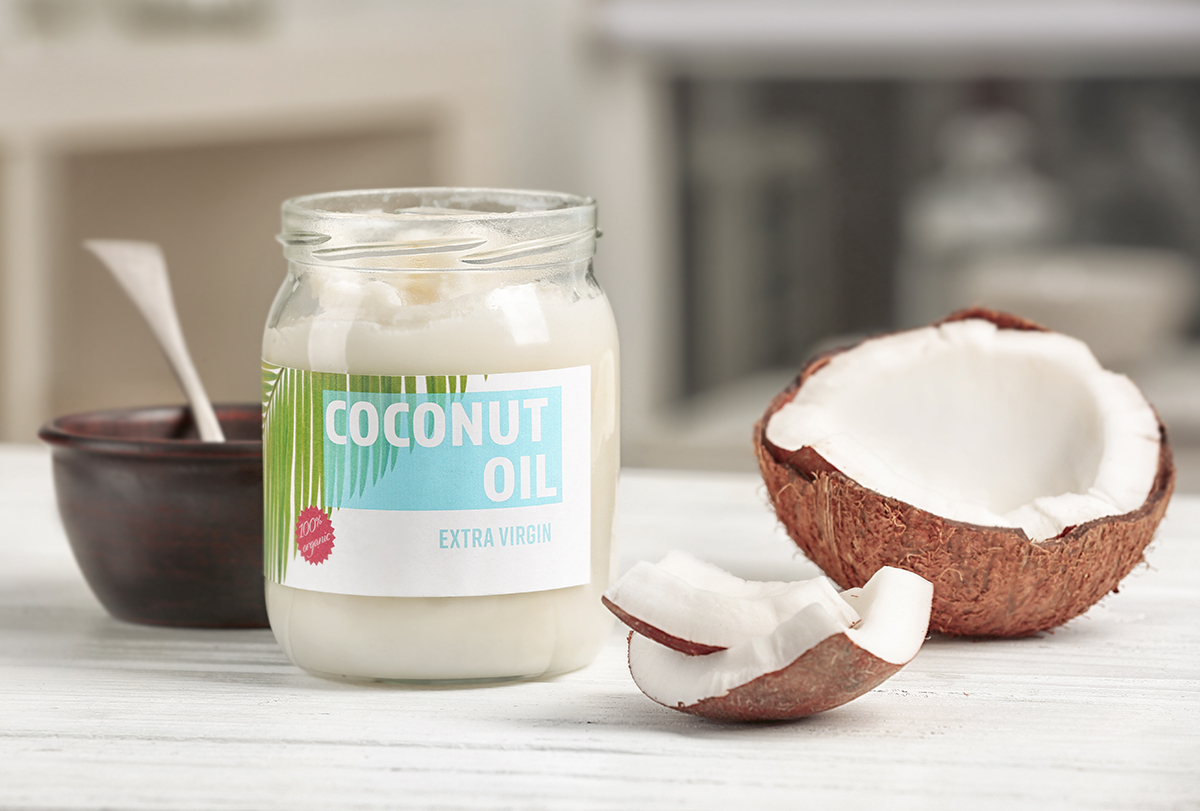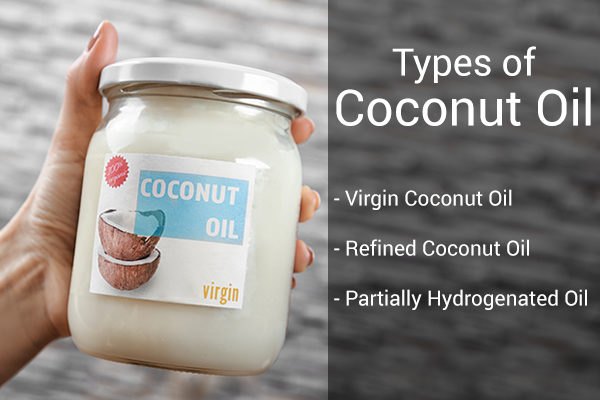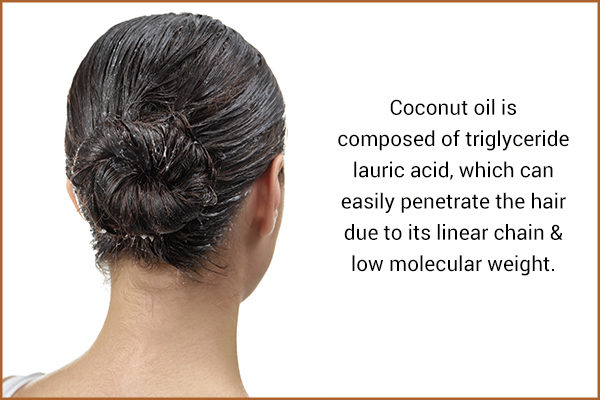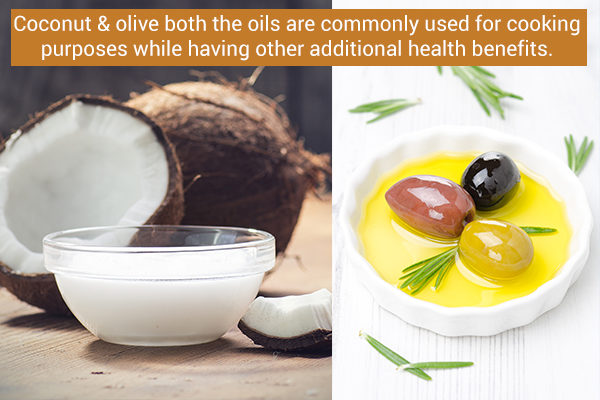In this article:
Coconut oil is a popular ingredient all over the world. It was generally considered exotic, but it is now readily available in markets everywhere. It is commonly advertised as a functional food and is endorsed by many, owing to its supposed health benefits.

Coconut oil is obtained from the brown, hairy seed of the coconut palm tree and is pale yellow. This oil is often used in cosmetics, food, and medicines.
Nutritional Value of Coconut Oil
Coconut oil is regarded by some to be a superfood for its various health and beauty benefits. It is chiefly composed of saturated fatty acids, making up approximately 85% of the oil. It also contains about 2% of polyunsaturated fat and 6% monounsaturated fat. (1)
Moreover, coconut oil is considered to be unique due to its unusual liquid/semi-solid state despite the high amount of saturated fatty acids. (1)
Types of Coconut Oil

Coconut oil is chiefly distinguished into the following three types:
1. Virgin coconut oil
Also known as natural oil, it is obtained by pressing the shredded fresh, wet coconut kernels to extract the oil and coconut milk. This oil has higher amounts of bioactive compounds such as tocopherols, tocotrienols (vitamin E forms), polyphenols, and sterols, in comparison with the other types of coconut oil. (2)
2. Refined coconut oil
This oil is obtained by crushing dried coconut meat and undergoes refining, bleaching, and deodorization (RBD). Refined coconut oil is also known as copra oil and lacks bioactive constituents. (2)
3. Partially hydrogenated oil
This type of coconut oil is processed to convert unsaturated fats (good fat) to trans fats (bad fat).
Possible Benefits of Coconut Oil
Coconut oil is believed to have various health benefits. Here are some of them.
1. May aid relief in atopic dermatitis
Atopic dermatitis, or eczema, refers to a chronic skin condition characterized by itchy, dry skin.
The application of coconut oil could help improve the symptoms of atopic dermatitis by hydrating the skin and helping lock in the moisture. However, further research is required to establish this claim. (3)
2. Can help nourish hair

Coconut oil contains the triglyceride lauric acid, which can easily penetrate the hair. Additionally, this triglyceride has a high affinity for hair proteins, thus helping provide nourishment to hair. (4)(5)
3. May play a role in diabetes
A few animal trials have shown the usefulness of coconut oil in managing type 2 diabetes. (6)(7) However, the consumption of coconut oil does not significantly affect markers of glycemia. (8) Therefore, due to a lack of human trials on the role of coconut oil in diabetes, it is recommended to use it sparingly.
ALSO READ: Healthy and Harmful Foods for Diabetics
4. May aid in weight loss
The theory for coconut oil possibly helping in weight loss is due to the medium-chain saturated fatty acids (MCTs), which promote a feeling of fullness and are more likely to be used right away for energy than stored.
However, studies that evaluate the effect of coconut oil on weight loss are lacking. Hence, there is a need for further studies. (9)(10)
5. May have a role in Alzheimer’s disease
Some research suggested that individuals with Alzheimer’s disease are unable to use glucose efficiently. Therefore, an alternative energy source for the brain may be beneficial.
While theories suggest that MCTs found in coconut oil can act as an alternative source of energy, there is very little scientific evidence to support this claim. (11)(12)
6. Other health benefits
When taken orally, coconut oil may help improve:
- Chronic fatigue
- Irritable bowel syndrome
- Crohn’s disease
- Diarrhea
- Thyroid conditions
- Breast cancer
- Immunity
Several studies also showed that coconut oil might protect the skin from UV radiation and exhibits antibacterial and antifungal activity. (13) Some research also suggested that oil pulling with coconut oil can be helpful in decreasing oral plaques. (14)
Additionally, the MCTs in coconut oil, when taken as a part of a ketogenic diet, may have a therapeutic effect on seizure control. (15)(16)
Moreover, the topical application of coconut oil may be useful in:
- Treatment of psoriasis
- Neonatal skincare
- Treatment of lice infestation
However, all these commonly talked-about benefits of coconut oil are purely anecdotal, with no sufficient scientific evidence to support them.
Role of Coconut Oil in Heart Health

Coconut oil is believed to have contradicting effects on heart health.
Studies showed that coconut oil consumption could increase LDL cholesterol levels in comparison with non-tropical vegetable oils. While it also improves HDL levels, it doesn’t help reduce the risk of cardiovascular diseases. (8)(17)
If you have any heart health issues, consult your healthcare team regarding the best use of coconut oil for your benefit.
Storing Coconut Oil
Proper storage of coconut oil can help retain its fragrance and stability.
Save coconut oil in a clean, airtight container in a shaded and cool place as it can be affected by oxygen, light, and heat. Discard the oil if it has turned yellow (indicating rancidity) or if you find mold growing on the surface of the oil.
Safety of Coconut Oil
Coconut oil is chiefly composed of saturated fatty acids (about 90%), (18) excessive consumption of which often leads to an increase in cardiovascular disease risk. (19)
The US Department of Agriculture (USDA) and the World Health Organization (WHO) recommend that saturated fats should not constitute more than 10% of the total calories taken daily. (20)(21) Hence, coconut oil should not be used as a substitute for other fats. (22) However, it is generally safe to consume coconut oil in normal food amounts as part of your diet.
Reactions With Coconut Oil
Coconut oil, when consumed in moderation, is not reported to have any interactions with drugs. However, it may produce allergic reactions in some cases. It is common to develop allergic dermatitis to products that contain coconuts.
It is recommended to perform a patch test of coconut-containing products to detect allergies. Some individuals may also be sensitive to coconut pollen.
Coconut Oil vs. Olive Oil

Heating oil increases its oxidation rate, causing a rapid breakdown. Therefore, to be used for cooking, oils should be able to resist oxidation. Refined coconut oil was found to have higher oxidative stability than other virgin oils.
However, olive oil is regarded to be a healthier option due to its high content of monosaturated fats, in contrast to the high saturated fat content of coconut oil. (23)
Expert Answers (Q&A)
Answered by Kathy Rollin, RDN
Coconut oil is not proven to promote weight loss. Although coconut oil contains medium-chain triglyceride (MCT) oil, which behaves differently in the body, it does not have the same satiating effect as MCT oil. (24)
Yes, it is safe to eat raw coconut. Coconut oil, derived from the kernel of mature coconuts, is also edible. (25)
Yes, coconut oil is an effective moisturizer for the skin.
Yes, it is safe to consume coconut oil. Evidence suggests that it can be taken in moderation and included as part of a healthy diet (also include unsaturated fats from sources such as olive oil, sesame oil, and fatty fish).
Coconut shells are pretty strong and are sometimes used to make charcoal and handicrafts.
Coconut water is good for treating dehydration caused by diarrhea or exercise. It is also used to reduce high blood pressure and improve exercise performance. However, it does not enhance fertility in both men and women.
Coconut oil is a tasty addition to cooking, especially when preparing Thai food. However, science has not provided enough evidence to support its use as a weight-loss tool or miracle food. It does contain MCT oil, but the jury is still out as to the effect of this oil on one’s health.
Coconut oil is a wonderful addition to ethnic dishes when used in moderation. Do remember that it is considered high in saturated fats. Therefore, excess intake is not encouraged by many health organizations, such as the American Diabetes Association.
About Kathy Rollin, RDN: Kathy is a registered dietitian-nutritionist and a certified personal trainer who enjoys helping people get healthy through behavioral and dietary changes. She also encourages people to enjoy movement.
Final Word
Coconut oil is purported to have various health benefits. However, studies on this oil were chiefly conducted on animals or in laboratories.
Therefore, limited conclusions can be drawn on the effects of coconut oil inclusion in the human diet. Currently, guidelines suggest the consumption of coconut oil in moderation.
- Was this article helpful?
- YES, THANKS!NOT REALLY


